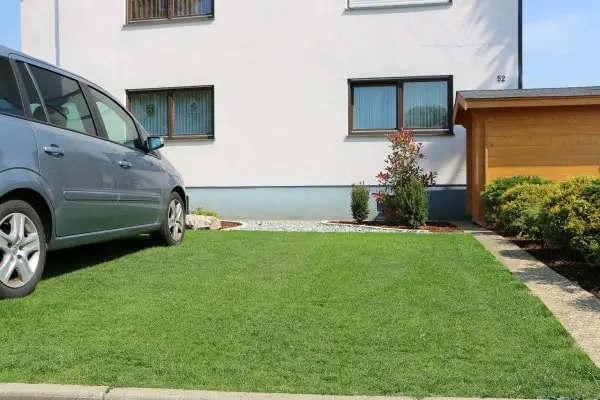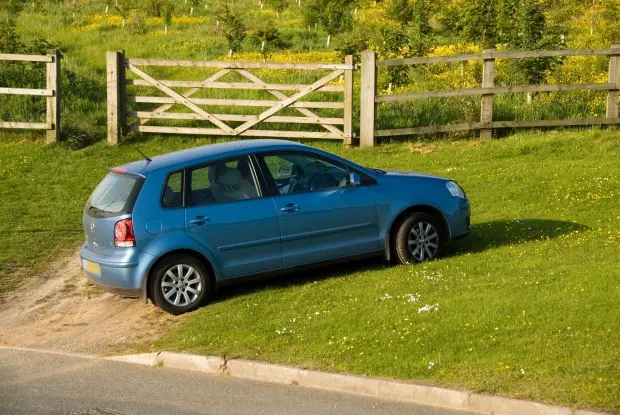Can You Park Your Car on Grass? Exploring the Pros and Cons
In this exploration of a seemingly simple yet often overlooked question: Can You Park Your Car on Grass? In this blog post, we’ll unravel the layers surrounding this query, considering both the practical aspects and potential consequences of turning your lawn into a parking space. Whether you’re drawn to the aesthetic appeal, intrigued by the cost-effectiveness, or simply seeking alternatives to traditional pavement, we’ve got you covered. Join us as we dig into the pros and cons of parking on grass, aiming to provide valuable insights for anyone pondering this verdant vehicular venture. Let’s navigate the green terrain together and discover if parking on grass is a feasible option for you.
Pros of Parking on Grass:
1. Aesthetic Appeal
Parking on grass has the potential to transform the visual appeal of your property, offering a green and natural parking space that seamlessly integrates with its surroundings.
This harmonious blend not only adds aesthetic charm but also contributes to a more environmentally friendly and serene atmosphere. Imagine stepping out of your vehicle onto a lush, green carpet—nature’s welcome mat right at your doorstep.
The allure of such a parking solution lies not only in its practicality but also in the visual poetry it brings to your property.
2. Cost-Effective
Indeed, one of the significant advantages of parking on grass is its cost-effectiveness compared to constructing a paved driveway. Opting for a grass parking solution proves to be a budget-friendly alternative, making it an attractive choice for homeowners mindful of upfront expenses.
By choosing this economical option, you can allocate resources more efficiently while still fulfilling your parking needs. This financial flexibility allows homeowners to invest in other aspects of their property or allocate funds to different priorities.
In the realm of practicality and affordability, parking on grass stands out as a sensible and wallet-friendly choice for those looking to balance functionality with financial considerations.
3. Easier on Tires
The softer nature of grass compared to pavement offers more than just a picturesque parking spot. It brings a practical advantage: being gentler on your car’s tires. This soft landing could potentially translate to reduced wear and tear on your vehicle over time. Imagine every park becoming a cushioned embrace for your tires, mitigating the impact of daily usage.
While aesthetics play a role, the inherent softness of grass introduces a layer of care for your vehicle, making it not just a parking space but a potential safeguard for your car’s longevity.
How To Power Broom Artificial Turf
4. Water Percolation
The benefits of parking on grass extend beyond the immediate parking space. Grass, being permeable, facilitates rainwater percolation into the soil, making a noteworthy contribution to improved water drainage.
This natural drainage system can play a vital role in maintaining a healthy lawn by preventing water stagnation and minimizing the risk of water runoff.
By embracing this eco-friendly approach, you not only create a parking solution but also become a steward of sustainable practices. It’s a harmonious balance where your parking choice becomes a positive force in nurturing a flourishing, well-drained landscape around your home.
Cons of Parking on Grass
1. Lawn Damage
While parking on grass has its advantages, it comes with a prominent drawback—the potential damage to your lawn. The constant pressure of vehicles can lead to compacted soil, the emergence of bare patches, and, in severe cases, the death of grass in high-traffic areas.
This drawback underscores the need for careful consideration and strategic planning when opting for grass parking.
Balancing convenience with lawn preservation becomes crucial, emphasizing the importance of adopting measures to mitigate the impact and maintain the overall health of your green space.
2. Mud and Dirt
Consider the weather factor: during rainy seasons or when the ground is wet, parking on grass may lead to mud and dirt accumulation on your tires. While the softness of grass can be advantageous in certain aspects, it may pose a challenge to keeping your entrance clean.
Imagine the scenario: a picturesque parking spot surrounded by lush grass, yet the trade-off includes the potential for a messier entry into your vehicle during wet conditions. It’s a balance between the benefits and the practical considerations, where the weather can play a role in the day-to-day usability of your grass parking solution.
3. Pest Habitat
It’s essential to consider the ecosystem that comes with grass parking. Grass provides a natural habitat for various insects and pests, and choosing to park on grass may increase the likelihood of these creatures finding their way into your car or home. While the green surroundings have their charm, this aspect highlights a potential challenge in managing pest intrusion.
It emphasizes the need for homeowners to strike a balance between the beauty of a grass parking space and the potential encounters with nature that come with it, ensuring a harmonious coexistence with the local insect population.
4. Limited Load Capacity
Consider the load capacity: grass may not withstand heavy loads for an extended period. This limitation becomes particularly relevant if you regularly park larger or heavier vehicles on your lawn.
While the aesthetic appeal of grass parking is evident, it’s crucial to acknowledge this practical constraint. Parking heavier vehicles on grass may lead to soil compaction and damage, challenging the durability of your green parking space.
This consideration underscores the importance of aligning your choice of parking surface with the specific demands of your vehicle, ensuring a sustainable and resilient solution over time.
Tips for Parking on Grass
To minimize the negative impacts of parking on grass, consider the following tips:
Rotate Parking Spots
A practical tip for maintaining a healthy grass parking area is to avoid parking in the same spot consistently. By distributing the impact across different areas, you reduce the risk of localized wear and soil compaction. This simple strategy promotes even more stress on the grass, contributing to a more sustainable and resilient parking solution.
It’s a small adjustment that can go a long way in preserving the health and aesthetics of your grassy parking space over time.
Use Pavers or Gravel
For an optimal grass parking solution, consider creating a designated area using pavers or gravel. This not only enhances the visual appeal but also minimizes soil compaction. Pavers and gravel distribute the weight of the vehicle more evenly, reducing the impact on the grass beneath.
This thoughtful approach addresses the potential drawbacks of soil compaction, ensuring a more durable and sustainable parking space. By integrating these materials, you not only enhance the aesthetics but also contribute to the long-term health of your grassy parking area.
Regular Lawn Maintenance
To foster the health of your grass parking area, implementing a robust lawn maintenance routine is key. Incorporate practices such as aeration and overseeding to promote grass health.
Aeration enhances soil air and water penetration, combating compaction, while overseeding introduces new grass seeds, revitalizing the lawn. This proactive approach ensures that your grass remains resilient, even in high-traffic parking zones.
By investing in a comprehensive maintenance routine, you not only preserve the visual appeal but also lay the groundwork for a thriving and enduring grass parking space.
Avoid During Wet Conditions
Exercise caution during adverse weather conditions: refrain from parking on the grass during heavy rain or wet conditions to prevent soil compaction and mud accumulation. This proactive measure mitigates potential damage to the grass and maintains the integrity of your parking area.
By being mindful of weather patterns, you contribute to the long-term health and functionality of your grass parking space, ensuring it remains a viable and attractive option in various conditions.
FAQs on Parking Your Car on Grass
Q1: Is parking on grass bad for the lawn?
Parking on grass can lead to soil compaction and damage, potentially harming the lawn. Proper maintenance and strategic planning can help minimize these effects.
Q2: Can I save money by parking on grass instead of paving a driveway?
Yes, parking on grass can be a more budget-friendly option compared to constructing a paved driveway. It offers cost-effectiveness without compromising functionality.
Q3: How can I prevent mud accumulation on tires during wet conditions?
Refrain from parking on the grass during heavy rain or wet conditions to prevent mud accumulation. Designated areas with pavers or gravel can also help minimize the impact.
Q4: Will parking on grass attract pests?
Yes, grass provides a habitat for insects and pests. Regular maintenance and proactive measures can help minimize the likelihood of pest intrusion.
Q5: Can grass withstand heavy loads from larger vehicles?
The grass may not withstand heavy loads for an extended period of time. Consider alternatives or implement strategies to distribute the impact across different areas.
Q6: What maintenance practices promote grass health in parking areas?
Implement a robust lawn maintenance routine, including aeration and overseeding, to promote grass health and minimize the impact of parking.
Conclusion
The decision to park your car on grass involves a delicate balance between aesthetics, practicality, and environmental considerations. While the allure of a green parking space is undeniable, it’s crucial to weigh the pros and cons carefully.
Parking on grass offers an aesthetically pleasing and cost-effective alternative, with potential benefits such as gentler tire impact and improved water drainage. However, it comes with challenges, including the risk of lawn damage, mud accumulation during wet conditions, and the attraction of pests.
To make the most of a grass parking solution, strategic planning is essential. Rotating parking spots, using pavers or gravel for designated areas, and implementing a robust lawn maintenance routine are key steps in mitigating potential drawbacks.
Ultimately, the decision to park on grass depends on your unique circumstances, priorities, and willingness to manage the challenges. By considering the points discussed in this exploration, you can make an informed choice that aligns with your preferences and contributes to the overall health and beauty of your property. Whether you choose the lush green embrace of a grassy parking space or explore alternative options, may your decision lead to a harmonious blend of functionality and natural elegance.

